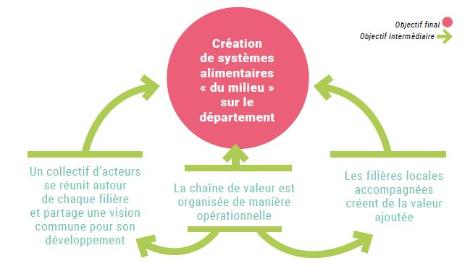Cérès accompanies territorialized food systems
The example of the frozen minced steak sector 100 % Charolais du Roannais
January 2019
Fondation Daniel et Nina Carasso (FDNC)
Towards a Europe of territorial food systems?
This study is extracted from the analysis of twenty-two French and Spanish projects related to new food models, all highlighting different challenges.
In Spain, governance is being built, while French food systems are looking for solutions to change scale. But in both countries, accessibility remains the weak link. Initiated in 2016 as part of the CERES project, set up in partnership with ISARA-Lyon and Roannais Agglomération, the 100% Charolais frozen minced steak from Roannais is today developed and distributed in 9 commercial chains in the Roanne district. The collaboration between Roannais Agglomeration, the breeders, the distributors and the slaughterhouse continues to build progressively a perennial local sector, economically viable and of quality.
Loire, France
In the Rhône-Alpes region, many food systems are emerging, between short and long circuits. On a territorial scale, these initiatives seek to lift the limits posed by the obligation of a single intermediary: the volumes marketed and access to distant customers. However, they are based on a strong proximity between producers and consumers and are based on sustainable development values. These are the « local food systems ». A team of teacher-researchers from the Isara-Lyon engineering school, a community of communes (Roannais Agglomeration) and the Loire Agri-food Cluster have joined forces to develop these innovative food systems. These partners provide operational support, scientific analysis of the dynamics and their sustainability, assessment and use of the knowledge acquired. Three systems are being supported: 100% Charolais frozen minced steak from the Roannais region, heavy pork on straw and Forez carp. These three initiatives do not have the same degree of maturity at the start of the project: negotiations between actors, degrees of convergence, availability…
The 100% Charolais du Roannais frozen minced steak « sector » is the common thread to illustrate this support approach in the Loire department.
Why Cérès ?
Cérès is the Roman goddess of agriculture, harvests and fertility. Here she symbolises the renewal of food systems through their territorialisation and the strengthening of their sustainability.
The 100% Charolais du Roannais frozen minced steak sector is built on transparency and equity between the different links. It relies on a strong involvement of the distribution sector to orient consumption habits towards local production: educational activities and a poster campaign contribute to the launch of this local sector. Trust and the integration of new players are important steps in the project’s trajectory: transparency has been a success factor.

Three lines of action have been decided upon to set up and sustain these projects: building a common vision shared with food actors, differentiating products to create added value, structuring and organising the value chain. Although presented in three distinct axes, the support proposed by the partners of the Ceres project is carried out simultaneously: the structuring of the group of actors can only be consolidated through a shared vision, but also through concrete progress concerning the definition of products and marketing methods. This process is supposed to lead each actor to find his place, in order to create balanced r contributions, which represents a guarantee of durability.
A transparent sector contract
From the outset, the Ceres project partners set the rules of the game, with a fundamental principle of transparency. All the clauses of the agreement between the various stakeholders were set out in a sector contract, drawn up with the support of the Loire Agri-food Cluster. This document sets out the conditions for membership, the commitments of each party and the distribution of added value. The price has thus been defined from upstream to downstream, based on the farmer’s production cost (€4.50 per kg carcass compared with €3.50 to €3.70 on the national market in 2017). The various charges (transport, slaughter, etc.) were then added to arrive at the selling price for the consumer (around €12 per kg). The steaks of the Charolais du Roannais sector remain in price ranges between private labels and organically produced meat.